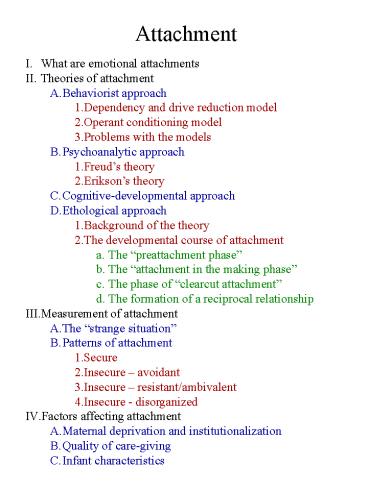Attachment - PowerPoint PPT Presentation
1 / 9
Title:
Attachment
Description:
The 'attachment in the making phase' The phase of 'clearcut attachment' ... look, smile, and seek proximity because mom reciprocates with smiles, hugs ... – PowerPoint PPT presentation
Number of Views:56
Avg rating:3.0/5.0
Title: Attachment
1
Attachment
- What are emotional attachments
- Theories of attachment
- Behaviorist approach
- Dependency and drive reduction model
- Operant conditioning model
- Problems with the models
- Psychoanalytic approach
- Freuds theory
- Eriksons theory
- Cognitive-developmental approach
- Ethological approach
- Background of the theory
- The developmental course of attachment
- The preattachment phase
- The attachment in the making phase
- The phase of clearcut attachment
- The formation of a reciprocal relationship
- Measurement of attachment
- The strange situation
2
Behaviorist Approach to Attachment
- The importance of feeding and drive reduction
- Elicits positive responses
- Mothers provide infants with additional comforts,
such as warmth, vocalizations - All occur in single setting
- Mom becomes source of reinforcement
3
The Effects of Blanket Attachment on Play
4
Behaviorist Approach to Attachment
- The importance of feeding and drive reduction
- Elicits positive responses
- Mothers provide infants with additional comforts,
such as warmth, vocalizations - All occur in single setting
- Mom becomes source of reinforcement
- Operant Conditioning model
- Infants look, smile, and seek proximity because
mom reciprocates with smiles, hugs - The greater number of behaviors that get
reinforced by particular person, the more one is
attached to that person
5
Psychoanalytic Approach to Attachment
- Freudian approach
- Similar to drive reduction
- Become attached to person who satisfies basic
biological drives (typically Mom) - Relationship with Mom then prototype for romantic
relationships throughout life - Eriksons approach
- 1st developmental stage birth 1 yr Trust vs.
mistrust - Children become attached to people who minister
to needs - Importance of mothers overall responsiveness
6
Cognitive-DevelopmentalApproach to Attachment
- Little to say about which people to whom one
becomes attached - Suggests that attachment depends, in part, on
level of cognitive development - Must be able to discriminate familiar persons
from strangers - Must recognize that familiar persons have
permanence object permanence abilities, as
discussed earlier - Thus, timing of attachment related to timing of
development of cognitive ability
7
Ethological Approach to Attachment
- Central feature of theory
- Babies born with in-born set of behaviors
- Behaviors elicit parent care, thus increase
change of survival - The developmental course of attachment
- The preattachment phase
- Behavior a matter of genetically determined
reflexive responses with survival value - Promote physical contact
- Attachment in the making
- Orient and respond with preference towards mom
- No specific attachment yet
- The phase of clearcut attachment
- Shows separation anxiety
- Mom as a safe haven
- Formation of a reciprocal relationship
- Decrease in separation anxiety
8
The Strange Situation Procedure
9
Patterns of Attachment
- Insecure Avoidant
- Little distress at separation
- Avoids mother during reunion
- About 20 of North-American infants
- Securely Attached
- Distressed during separation
- Seeks out mother during reunion
- About 65 of North-American infants
- Insecure Ambivalent/Resistance
- Distressed throughout, and during separation
- Reunion a mixture of relief and anger
- About 10 of North-American infants
- Insecure Ambivalent/Resistance
- Combination of avoidant and ambivalent/resistant
- Confusion over whether to approach or avoid
- During reunion may act dazed or freeze































